|
Artist
Talk and Speculative Biology Workshop with Pinar Yoldas
Artist
Talk with Pinar Yoldas
3 October, 2013 at 7 PM
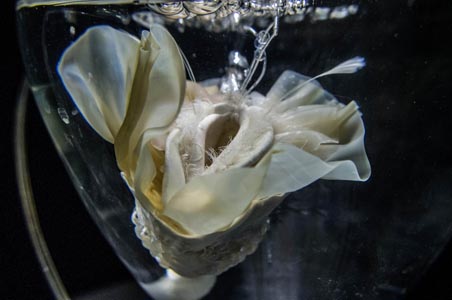
Pinar Yoldas is a cross-disciplinary artist and researcher with
a background in architecture, interface design, computing and neuroscience.
Her work investigates social and cultural systems in regards to
biological and ecological systems. She is the 2013/14 resident at
the Vilém Flusser Residency Programme for Artistic Research,
run by transmediale and the Berlin University of the Arts (UdK).
Pinar has a Master of Fine Arts degree from University of California
Los Angeles. Currently she is a PhD candidate in Visual and Media
Studies program at Duke University, where she's pursuing a certificate
in the Center for Cognitive Neuroscience. She has been awarded fellowships
in art and science venues including the MacDowell Colony, UCross
Foundation, VCCA and National Evolutionary Synthesis Center.
Her current project An Ecosystem of Excess is an attempt
to create a post-human eco-system, a living community of speculative
organisms and their environment. The project takes the idea that
we are surrounded by "man-made extreme environments" as
its starting point. A man-made extreme environment is a site of
excess, where leftovers of our capitalistic desires and consumerist
actions are accumulated. Hence junkyards, landfills, wastelands
are all examples of "man-made extreme environments'. An Ecosystem
of Excess starts in the Pacific Trash Vortex. Discovered in 1985
by Captain Roger Marshall, this site is a floating nexus of plastic
waste covering roughly 5000 km² area of the Pacific. Pacific
Trash Vortex is a monument of plastic waste at a global scale.
http://www.transmediale.de/content/project-description-an-ecosystem-of-excess
http://pinaryoldas.info/speculativeBiologies/
in cooperation with transmediale
Speculative
Biology Workshop:
The Design of Biological Systems and Neo-organs
with
Pinar Yoldas
28 September, 2013 from 1-6PM
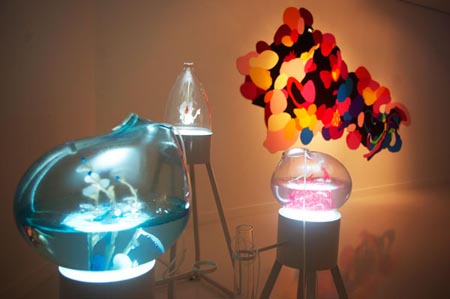
“...from so simple a beginning endless forms
most beautiful and most wonderful have been, and are being, evolved.”
(Charles Darwin)
Unlike man, nature expresses efficiency through complexity, where
each organism seeks new ways to exploit resources, and to defend
against being 'exploited' in turn. And now man, a creature who would
become the supreme exploiter, has in the last few centuries radically
changed the equation. Pumping hydrocarbons out of the earth to run
manifold industries, and produce energy for profit and leisure,
we are not only changing the face of the earth, but also the atmosphere,
and with it the climate - which in turn has set off an almost endless
set of reactions throughout the biological systems of the planet.
As artist Pinar Yoldas writes: "Our capitalistic biomass manufactures
mountains of e-waste, beaches of tar, rivers of zinc, oceans of
plastic. We are an army of plastic surgeons giving the planet a
new face. A face that opens its eyes to new life forms, new beginnings,
new extremities. What kind of fish will swim in the plastic ocean?
Who will be sunbathing on the beaches of tar? What plants will thrive
in a forest of concrete and steel? Which insects will lay eggs on
the valleys of asphalt? What birds will fly in the hazy mornings
of a smog stained sky?"
In her workshop the artist will give a quick overview into general
biological systems such as the circulatory system, the respiratory
system, the nervous system, the reproductive system etc., and how
these systems (or more specifically organs) might evolve under the
influence of global environmental transformations.
Somewhere between bio-mimicry and critical design, the workshop
will give you the time and assets to design your own lungs, grow
that extra organ you always wished for or think about that ultimate
meat supplier with zero methane impact you have been craving for.
Participants will then discuss and design speculative models for
life forms for a post-human era.
http://katausten.wordpress.com/2013/10/05/information-overload-the-scape-coat-solution/
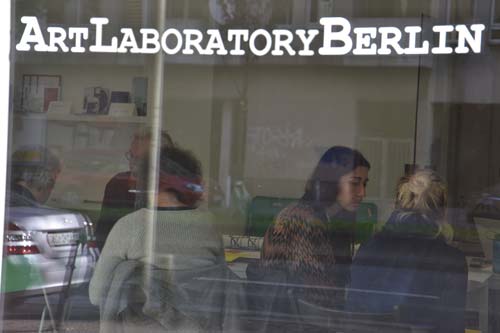
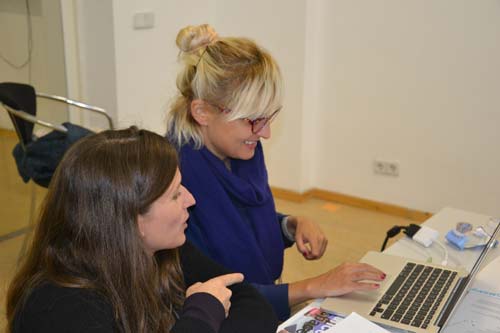
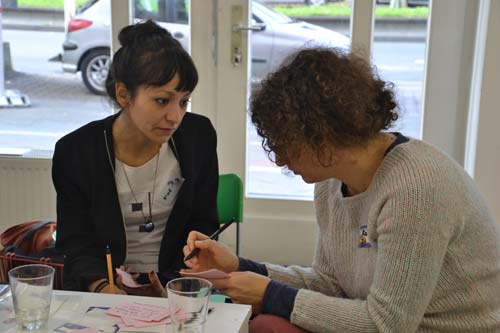
|
|

